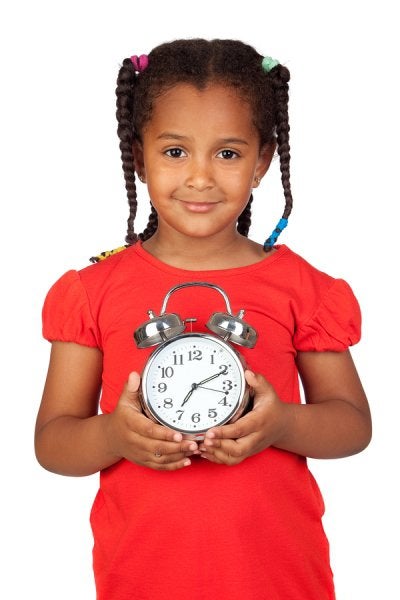-
Telling Time: Simple Ways to Reinforce Lessons at Home
Telling time is an important skill, but it is becoming increasingly challenging for children, who often have few opportunities outside of their early education center to practice. If your child is in preschool or Kindergarten in Pembroke Pines and you want to help him or her master time-telling skills, these activities will help you reinforce the lessons that they are getting at school.

Go Analog
With digital clocks everywhere from your oven to your TV box and smartphone, kids may not understand why they need to learn time. If your house is one of the many homes that only has digital clocks, invest in a few analog clocks that your child can use to practice telling time at home. Use the clocks when you need to know what time it is, and talk your child through how you are reading the clock. Encourage your child to look at those clocks as well, and as his or her skills in telling time grow, he or she can look at the analog clock, tell the time, and then check it against the digital clocks.
Practice Skip Counting
Counting by fives is a helpful skill to have when it comes to telling time. If your child has his or her numbers mastered, start working on counting by fives. Keep practicing until your child can easily count to at least 60 by fives, and then start applying that kind of counting to telling time. This lets your child see how time is counted off in five-minute increments and can help him or her get a better understanding of reading the clock.
Use Timed Activities
Give telling time real-world applications by having your child time his or her favorite activities. For instance, you may tell him or her that you are going to leave for the park in 10 minutes, and ask your child to tell you where the hand will be on the clock. Tying time concepts to things your child is doing will incentivize him or her to keep working on time skills.
-
Essential Tips for Library Visits with Toddlers
Going to the library is a great way to get your toddler excited about reading and to support the activities he or she is doing at his or her early childhood education center in Pembroke Pines . Library visits can be a fun and positive experience for your toddler and a good way to get him or her engaged in activities that don’t involve the television or your mobile device. Make the most of every library visit with this advice.

Set the Expectations
Before you go to the library, tell your toddler how you expect him or her to behave. Through being a student at an early learning center, your child will have practice following the rules and knowing when to be quiet and when to play, so put these skills to use in the library. Practice talking in a soft voice, and tell your child that he or she can only take one book off the shelf at a time. Remind your toddler to stay with you at all times. When you go into the library with these rules in place, you can focus on enjoying your visit instead of chasing your little one around.
Get Excited About Exploring
The library is full of wonders for your child, so let him or her have fun exploring every nook and cranny. As long as he or she sticks by you, let your child wander the aisles, look at the displays, and enjoy the toys and activities in the kids’ section. Don’t limit visits to just looking at books or just sticking to one section of the building. Getting your toddler excited about the library will get him or her excited about reading for life.Check Out Books
Your toddler will love the opportunity to pick out books to read together at home. Set a limit and help him or her browse, making selections together. Involve your child in the checkout process, and then use the opportunity to teach him or her about caring for books properly. Find a space at home that is just for library books, so they don’t get mixed with your own collection.
-
Raising Empathetic Children
In addition to the academic aspects, one of the biggest benefits of early childhood education is that it gives your child the opportunity to learn and practice social skills. When your toddler is in daycare or an early learning center in Pembroke Pines , he or she will learn skills, like empathy, in interactions with other students.
Watch this video to learn more about what you can do to raise your child to be empathetic to others. Although researchers believe that some level of emotional intelligence, like empathy, is genetic, there are many ways you can foster it and teach it in your child. Talk about interactions your toddler has at his or her early learning center in which your child noticed how another child was feeling. Talk about feelings characters in books or on TV shows are having. Above all, model empathetic behavior, so that your child follows your example.
-
How Much Sleep Do Young Learners Need?
When your child starts early childhood education, you may wonder how the extra demands on his or her day will impact his or her sleep schedule. It’s important for young learners to get the right amount of sleep every day to remain happy and engaged in his or classroom in the early childhood learning center in Pembroke Pines .
Sleep needs change with ages. Most toddlers need between 11 and 14 hours of sleep per day, though some may need as little as nine and as much as 16. Preschool kids need about 10 to 13 hours, though some can thrive with as few as eight hours, while others may need 14. Pre-K and Kindergarten kids generally need 10 to 13 hours of sleep, with a minimum of eight and a maximum of 14 hours. Keep in mind that these hours can include daily naps, though early bedtimes are generally best for giving kids the full amount of rest they need.

RECENT POSTS
categories
- Uncategorized
- Early Learning Center
- Pre-K
- Children
- Child Care Center
- Preschooler
- Preschool Blog Category | Tanglewood Academy
- Preschool Lunch
- Tanglewood Academy
- After-School Program
- Toddler School
- Early Childhood Education
- preschool activities
- pre-kindergarten
- childhood education
- pre-kindergarten programs
- Children’s education
- enrichment opportunities
- Kindergarten
- Nurturing Education Environment
- Toddler Care
- Child Separation Anxiety
- Toddlers
- Summer camp
- summer activities
- VPK
- Voluntary Pre-K
- Outdoor Activities
- Smart Strategies
- Tie Shoes
- Snacks
- Physical Activities
- Education
- Enrichment Activities for Kids
- Early Education Activities
- Preschool Curriculum
- Classroom Learning
- APPLE accreditation
- Language Comprehension
